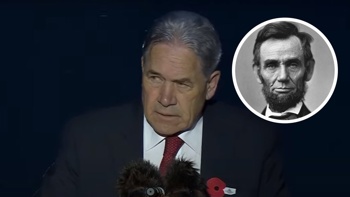Labour is in the early stages of a backdown on its controversial decision to entrench parts of the Three Waters legislation - a move constitutional experts said set a “dangerous precedent”.
The move came as Prime Minister Jacinda Ardern and Leader of the House Chris Hipkins admitted to not being aware that a fresh move to entrench a part of the bill had been put until after it was passed. Official advice provided to Local Government minister Nanaia Mahuta more than a year ago warned that even Labour’s original entrenchment proposal could be constitutionally damaging.
Ardern said Cabinet considered the issue of the entrenchment clause on Monday and resolved to kick the matter back to Parliament’s Business Committee - a cross-party group of MPs that discuss the running of Parliament.
It now appears likely the part of the bill that was entrenched will be removed before the legislation is finally passed in the next sitting block.
Ardern said she agreed with concerns raised by members of the legal community and that she wanted to be “cautious about where the principle of entrenchment [is used]”.
Last week, Labour and the Greens voted for an amendment to Three Waters legislation that entrenched a particular clause, meaning it could only be repealed with the support of 60 per cent of Parliament, or a referendum - unless MPs decided to cross a constitutional red line and repeal the entrenchment with a bare majority.
Constitutional experts, in an open letter, said the move was unusual and violated the convention that only specific parts of New Zealand’s electoral laws that cut to the very heart of our constitution are entrenched.
This represented a departure from that because it entrenched a policy issue, namely that water services could not be privatised.
Ardern appeared to side with these concerns on Monday.
“Understandably, there have been those with a constitutional law background that have raised principle concerns around where entrenchment is used,” Ardern said.
- David Seymour: Three Waters entrenchment shouldn't have been "rushed through"
- NZME business commentator weighs in on Three Waters entrenchment discussion
- Government says they will discuss entrenchment in Three Waters legislation
“We agree we do need to be cautious about where the principle of entrenchment [is used]. Our plan is to go back to the Business Committee, discuss where entrenchment is used more broadly, and look to resolve the issue,” Ardern said.
She maintained that the entrenchment in the Three Waters legislation was slightly different, because it entrenched the clause at a threshold of 60 per cent - meaning 60 per cent of MPs or a successful vote at a referendum would be needed to repeal it.
The entrenched parts of the electoral act were entrenched at 75 per cent, a far higher threshold.
The constitutional implications of the move were only picked up over the weekend in a series of tweets from Victoria University Associate Professor Dean Knight.
Knight said he “welcomed” news of a “rethink”.
/cloudfront-ap-southeast-2.images.arcpublishing.com/nzme/3VXGPEVUYR6DNOOFHRM4K7JSJY.jpg)
The amendment came from Green MP Eugenie Sage. Photo / Sylvie Whinray
“Elevated protection against future legislative change for a matter of policy like anti-privatisation would sit uncomfortably with our constitutional traditions and conventions. And would have opened up a huge can of worms, where entrenchment is able to be used as an ideologically-driven political tool, rather than, as they should, be reserved for constitutionally-significant democratic protections that are truly above politics.” Knight said.
He said it was “pleasing” Ardern had “recognised and accepted that the last minute entrenchment doesn’t square with those principles and that the issue needs more time to breathe”.
“It’s right that proposed constitutional changes like this get closer scrutiny and considered input. We will be watching the Business Committee closely to see how they find a solution to the current problem and broader issue of what should be protected and how,” he said.
Knight said the Bill would be recommitted to the Committee of the Whole to remove the clause before the Bill is passed into law. The Committee of the Whole is the stage in the legislative process where MPs are able to make amendments to the bill clause-by-clause.
National’s justice spokesman Paul Goldsmith said the Government should just commit the bill back to the Committee of the Whole stage instead of going through the Business Committee First.
“It’s got nothing to do with the Business Committee really. The Government should just admit they made a mistake and commit to fix it instead of fluffing around,” Goldsmith said.
The Government first proposed entrenching anti-privatisation measures in the bill in April of this year
Ministers said National should back their amendment to ensure water assets could not be privatised unless a 75 per cent Parliamentary majority could be reached or a majority of voters supported privatisation in a referendum.
National said it would not privatise water assets, but would not back the amendment out of its broader opposition to Three Waters.
Advice from Officials at the Department of Internal Affairs on Labour’s first proposal warned ministers more than a year ago that entrenching, even with National’s support, would raise constitutional questions.
Officials warned that “[e]ntrenching a substantive policy setting in this way is also likely to create a precedent, resulting in a push for more significant policy settings to be entrenched in the future”.
The advice warned that “[a]t minimum, clear cross-party support from the significant majority of MPs is be required to entrench provisions”.
Officials said anti-privatisation parts of the bill " might be further strengthened without resorting to entrenchment, and we are happy to explore these options with Parliamentary Counsel [the Government’s law drafter]”.
After National rebuffed Labour’s offer of entrenching the clause together, the issue appeared to die.
That is, until Green MP Eugenie Sage put up an amendment to the bill last week to entrench at a lower threshold of 60 per cent.
Remarks from Ardern and Leader of the House Chris Hipkins on Monday made it clear that there were mixed levels of knowledge of the amendment among Labour’s leadership, despite Labour voting in support of the amendment.
“The last I had heard was for a 75 per cent entrenchment which would have failed with only Labour and the Greens supporting it,” Ardern said.
“I wasn’t aware until after the fact that that had been lowered to 60 per cent - I wasn’t in the House when it happened,” Hipkins said.
Sage defended the amendment saying the “only way to guarantee a water secure future for our kids is to keep infrastructure and services in public ownership – and to protect this principle in law”.
“We agree that entrenchment should be done only for matters of utmost importance. Retaining the public ownership of water assets meets this threshold,” she said.
Take your Radio, Podcasts and Music with you









